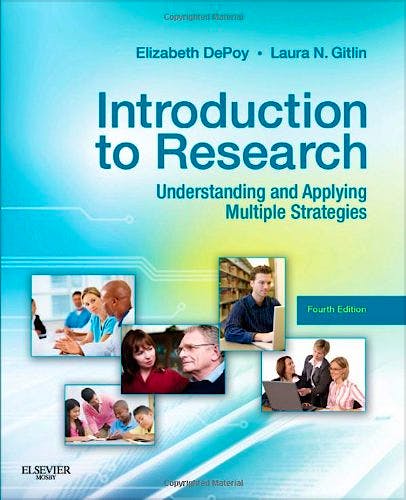

No hay productos en el carrito



Introduction to Research. Understanding and Applying Multiple Strategies
Gitlin, L. — DePoy, E.
4ª Edición Noviembre 2010
Inglés
Tapa blanda
384 pags
599 gr
19 x 24 x null cm
ISBN 9780323068543
Editorial MOSBY
Description:
Bridge the gap between research and practice with DePoy and Gitlin's Introduction to Research: Understanding and Applying Multiple Strategies, 4th Edition. This completely updated, user-friendly text helps you better understand not only the research process, but also research designs and their applications to the real world of clinical practice. Covering multiple research strategies (including both qualitative and quantitative research), it gives you a balanced approach to various research traditions, addressing the key issues that are emerging in today's health care environment.
Features:
- Offers a balanced approach to various research methods and multiple research strategies, including qualitative, quantitative, naturalistic and experimental-type, and more.
- Presents complex information in a clear, highly readable, and easy-to-understandmanner.
- Keeps information relevant to today's health care environment with real-world "snapshots" and a final Stories from the Field chapter.
- Includes detailed discussions of qualitative and quantitative methodologies, a unique and balanced focus that makes this text more comprehensive than others in its field.
- Covers experimental-type, naturalistic, and mixed method design strategies, improving your ability to compare, contrast, and integrate different methods.
- Evolve online resources include statistics math tips to accompany Chapter 19, crossword puzzles, useful weblinks, and sample forms.
New To This Edition:
- Reflects recent changes in the field, including new material on preparing poster presentations, community and participatory research, translation issues, and advanced scale development, giving you the tools you need to devise successful research studies.
- Includes expanded evidence-based material and occupational therapy-specific information, discussing the methods used in each study.
Table Of Contents:
Part I: Introduction
1. Research as an important way of knowing
2. Essentials of research
Part II: Thinking Processes
3. Philosophical foundations
4. Framing the problem
5. Developing a knowledge base through review of the literature
6. Theory in research
7. Formulating research questions and queries
8. Language and thinking processes
Part III: Design approaches
9. Experimental-type designs
10. Naturalistic inquiry designs
Part IV: Action processes
11. Setting the boundaries of a study
12. Protecting the boundaries
13. Boundary setting in experimental-type designs
14. Boundary setting in naturalistic designs
15. Collecting information
16. Measurement in experimental-type research
17. Gathering information in naturalistic inquiry
18. Preparing and organizing data
19. Statistical analysis for experimental-type research
20. Analysis in naturalistic inquiry
21. Sharing research knowledge before the study
22. Sharing research knowledge during and after the study
Part V: Improving practice through inquiry
23. Case study designs
24. Reciprocal role of research & practice
25. Stories from the field
Appendix: Informed consent documents
Glossary
By Elizabeth DePoy, PhD, OTR, MSW, University of Maine, Orono, ME and Laura N. Gitlin, PhD, Thomas Jefferson University, Philadelphia, PA
© 2025 Axón Librería S.L.
2.149.0